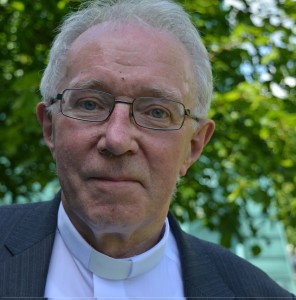
By Sarah Mac Donald - 24 June, 2015

Bishop John Kirby, retired chairman of Trócaire, who attended the climate justice conference in Maynooth on Tuesday.
Due to climate change, the sixth mass extinction of life on earth since life began is underway triggered by humans, eco theologian Fr Sean McDonagh told a conference on climate justice in Maynooth on Tuesday.
The Columban missionary, who advised the Vatican’s Pontifical Council for Justice and Peace on the first draft of Pope Francis’ encyclical ‘Laudato Si’, warned that if nothing is done to stop climate change up to one million species could be extinct within the next fifty years.
Other consequences, he highlighted, is the continued acidification of the oceans and the disappearance of up to one third of the world’s birds.
A 4 degree increase in global temperatures would turn the Amazon into a savannah within one hundred years.
Fr McDonagh echoed the findings of a new report which warns that the window of opportunity to prevent the worst mass extinction since the disappearance of the dinosaurs 65 million years ago is “rapidly closing”.
At the moment, agriculture, particularly in developing countries is showing the effects of climate change. “You can’t have agriculture if you don’t know when to plant and when to reap” Fr McDonagh underlined.
The Columban priest, who first became interested in the need for care of the earth in the 1980s when he saw the impact of deforestation in the Philippines, described the new encyclical ‘Laudato Si’ as “extremely significant” but said it was “way beyond where the Church or any Church is at this time” on the issue.
He warned that something concrete like a synod would be necessary to educate people at parish level and diocesan level about the encyclical’s teachings otherwise it would be forgotten in the same way as Pope John Paul II’s 1990 document ‘Peace with God the Creator and Peace with all Creation’ was ignored.
Fr McDonagh also questioned whether ecological theology is being taught as a serious subject in educational institutions like St Patrick’s College Maynooth.
Former president of Ireland Mary Robinson, who heads up a foundation which campaigns on climate justice, described Pope Francis as “one of the most influential moral voices on our planet today”.
In a keynote address to a conference on climate justice in Maynooth on Monday, the UN Secretary General’s special envoy on climate change praised the encyclical.
She said the Pope shows his “profound understanding of the connection between nature, justice for the poor, human dignity and the need to act in solidarity in the face of climate change”.
She added that the Pontiff had established climate change and safeguarding the earth for humanity as “a fundamental moral issue of our time”.
Dr Robinson emphasised that the timing of the encyclical would help mobilise support for a climate justice approach ahead of world leaders adopting a new climate agreement at the UN summit in Paris in December.
“2015 presents the world with a significant opportunity to ensure that we deliver a new pathway to the future,” she told the two-day conference which was co-hosted by Trócaire, St Patrick’s College and NUIM.
She called for a robust set of agreements which guarantee a pathway to end extreme poverty, reduce inequality and minimise the risks posed to development from climate change.
Bishop Denis Nulty of Kildare & Leighlin attended Mary Robinson’s keynote address.
Bishop John Kirby, the retired chairman of Trócaire, attended the address given by Fr Sean McDonagh, Bishop Theotonius Gomes of Bangladesh and author and environmentalist Bill McKibben.
“I can see the logic of what people are saying and the huge impact of climate change on the developing world,” Bishop Kirby commented afterwards.
He recalled his visits with Trócaire to Ethiopia which was feeling the effects of drought and his visit to Bangladesh where there deep concern over rising sea levels and continuous flooding.
Bishop Gomes of Bangladesh explained how climate change is affecting people in huge numbers in his “very densely populated” country. Any rise in sea level would displace huge numbers of people he warned.
Bangladesh, he warned, was increasingly threatened by pollution caused by industrialisation in an “uncontrolled fashion” and this in turn was contributing to climate change.
Calling for a more integrated approach between agriculture, technological advances with economic development, the retired auxiliary bishop of Dhaka appealed, “All must live on this earth with dignity. The Church must address this issue.”
In his keynote address, ‘From Evidence to Action – We are All Activists Now’, author and environmental activist, Bill McKibben described ‘Laudato Si’ as an “astonishing” document.
He told the packed lecture hall, “There is no longer any excuse for people not knowing about this issue”. He also warned that Bangladesh and the particular problems it is facing now could become everyplace.
He urged people to challenge the power of the fossil fuel industry which he described as the “most irresponsible industry on the planet”.
He also outlined how the organisation 350.org had become a global environmental movement and mobilised 5,200 demonstrations around the world from China to the Red Sea, from the Maldives to Wales highlighting the significance of the number 350.
350 refers to scientists’ belief that we must reduce the amount of CO2 in the atmosphere from its current level of 400 parts per million to below 350 ppm.
One of the workshops held on Tuesday looked at faith-based action at which Mercy nun Sr Mary Carmody spoke about the Tearmann Community Garden in Co Wicklow and Jim Farrell spoke about the diocese of Raphoe’s justice and peace group and its increasing involvement with Trócaire on the issue of climate justice and trafficking.